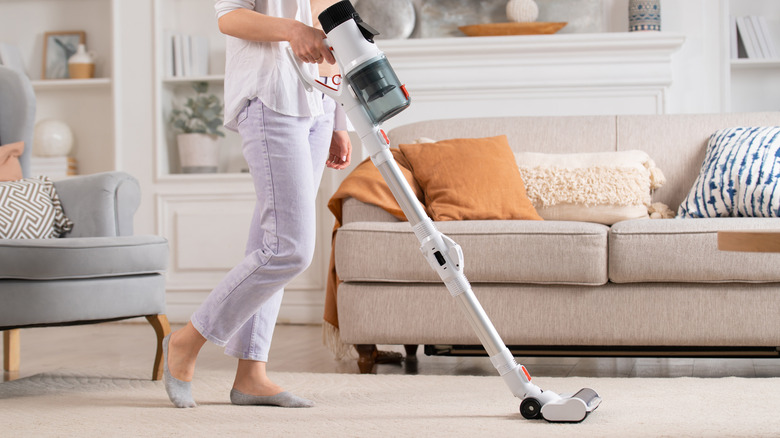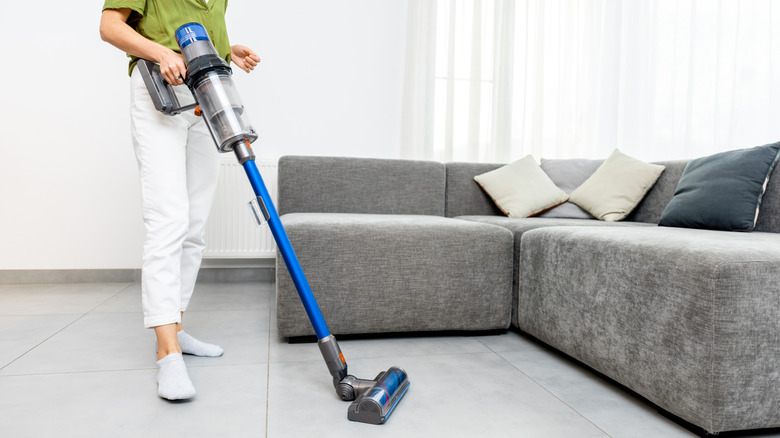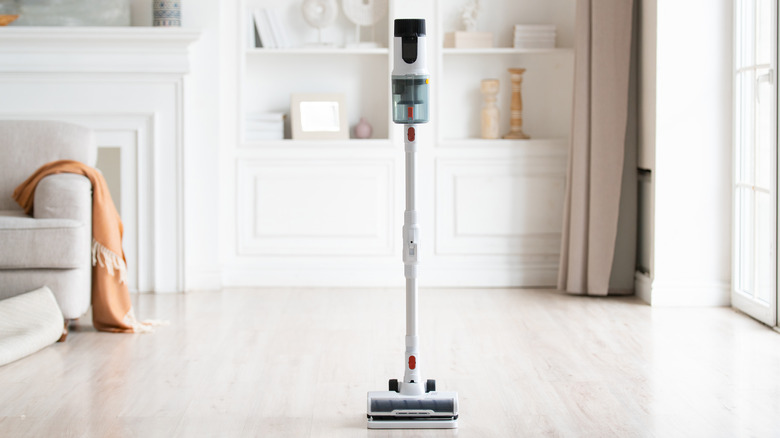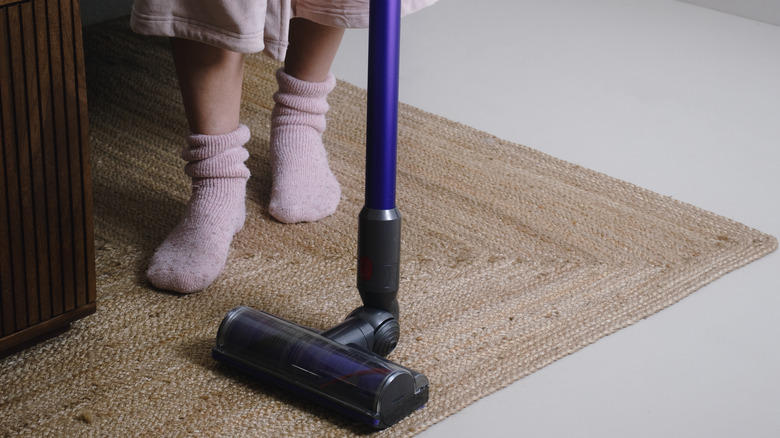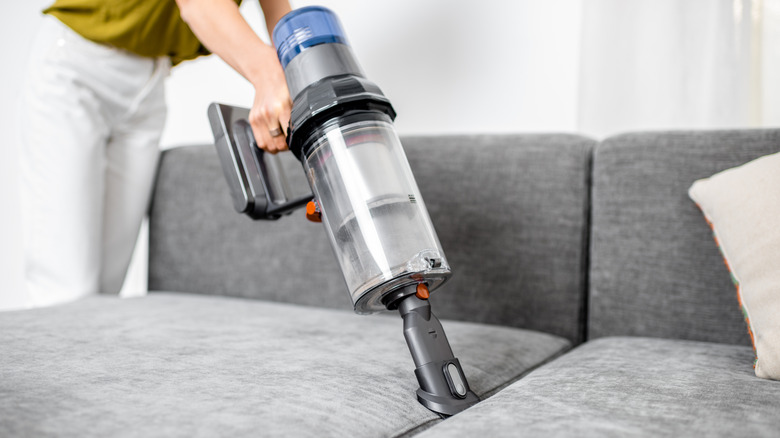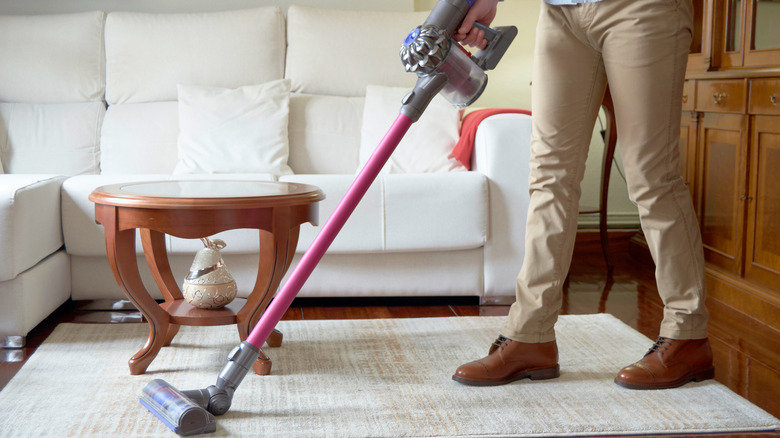Are Cordless Vacuums Worth The Hype?
Cordless vacuums offer enhanced cleaning mobility to homeowners. They are an immensely useful tool, but not everyone is sold on the value and general hype that cutting the cord represents. A cordless vacuum requires, above all else, a reliable battery and consistent charging habits. This means that homeowners who often forget to plug in electronics to keep them charged and ready for use may see limited benefits from the addition of a cordless vacuum. Yet, the boost in mobility and utility is astonishing when used to its full potential.
Modern cordless vacuums perform to the same standard as their corded counterparts, according to Abt, making them a staple instrument of cleaning in many homes that feature lengthy interior dimensions and hard-to-reach spaces. Cordless vacuums are a great innovation that truly make cleaning a breeze for many homeowners, but it's worth exploring what makes them so valuable while keeping an eye on the potential drawbacks when searching for a new vacuum for your home.
A high-voltage battery is essential
A corded vacuum doesn't suffer from loss of power and resulting suction since it is plugged directly into the main power source through your wall outlet. The ingredient that makes a cordless vacuum what it is has to be the battery. A high-quality, high-voltage lithium-ion battery is a must in any cordless device. This type of battery allows you to continue picking up dust and debris from the floor throughout each charge, notes Abt. Therefore, selecting a cordless model that includes a good battery is the first and perhaps most important part of the decision-making process.
Tech Radar recommends a few of the best cordless models on the market, trending toward the most popular brands. This comes as a result of the battery quality and capacity that these units bring to the equation. With a more powerful battery, you can experience longer usage times between charges, and pick up debris with greater confidence throughout the cleaning process. With a poor quality battery in your vacuum, you may lose power quickly or see debris that was just picked up falling back out of the vacuum as soon as you turn it off.
Cordless vacuums provide flexibility
Homeowners tend to choose cordless vacuum models because they provide enhanced flexibility. Corded models simply can't get to some of the hard to get to places that a cordless vacuum can easily reach. In addition, cordless vacuums typically include more adjustable parts and better flexibility within the unit itself. This means you can use a cordless vacuum to clean ceiling fans, corners, walls, or the trunk of the car without breaking a sweat, notes Vacuum Tester.
The versatility of a cordless vacuum is immense. These units are easy to carry around, and because you won't have to worry about plugging the vacuum into a socket, you can use them anywhere. Proscenic also notes that cordless vacuums are safer to use as well because they don't involve dragging around a long and unruly cord that can get tangled around feet or objects in the home. As a result, knocking over decorations or furniture is a thing of the past.
Collection capacity
While cordless models are more flexible and with a quality battery, can provide similar suction power as a corded option, they often sacrifice collection capacity, explains Abt. Its smaller footprint means that something has to give, and typically this is collection capacity. This means that you'll need to empty out the debris that you've vacuumed up more frequently. It can be inconvenient to perform this task more often than with a different type of vacuum, and the more times you open the units the higher the likelihood of spills or other additions to the mess you are trying to clean up.
However, the tradeoff is worth it for many homeowners — in exchange for a smaller collection, you get a vacuum unit that's easier to handle and provides better utility. It's worth noting, though, that not all features of a cordless vacuum are going to outperform those of the older, corded models. With improvements in technology, making the decision to switch has become easier over time, but there will continue to be areas in which corded vacuums outperform the newer options.
Cordless vacuums provide a quick solution
The small size and ease of use make cordless vacuums far more accommodating for quick cleanups. Hauling out a large, corded vacuum to suck up a simple mess is cumbersome and often adds to the trouble. If this is your only cleaning option, of course, it can't be avoided, but many homeowners have used a combination of larger vacuums and a small, battery-operated handheld device for years. The Dustbuster, for example, has been ubiquitous with this type of cleaning need since it's invention in 1979, explains the U.S. Patent and Trademark Office.
Yet modern iterations of the cordless vacuum can perform both functions easily. Many of these models come with modular attachments, meaning a single vacuum cleaner can be used as a small handheld device or attached to the larger, floor-based extension. Pulling out a cordless vacuum to pick up a small amount of dirt that's been tracked into the house, a food spill, or any other contained mess is simple, and can make the task of cleaning virtually anything far less stressful and much faster.
Weight can determine functionality
Weight is a big deal when working through cleaning routines. This might not seem like an overly important factor for a device that rolls across the floor, but it certainly plays a part in making the decision to purchase one model versus another. The weight of a vacuum cleaner is felt with each push and pull across the floor. You can feel it even more when lifting it to walk up a set of stairs or place it back in its storage place.
Your Best Digs notes that vacuum cleaners that weigh more than 15 pounds (which was typical for older, forged metal vacuums) can be immensely difficult to move around the room and even harder to lift. Conversely, swivel technology and a weight threshold that doesn't break double digits are typical for cordless models, while these features sometimes make it into the production of corded vacuums. A heavy vacuum cleaner can be an unruly machine, but an integral feature of the cordless model is its lightweight construction and overall maneuverability.
